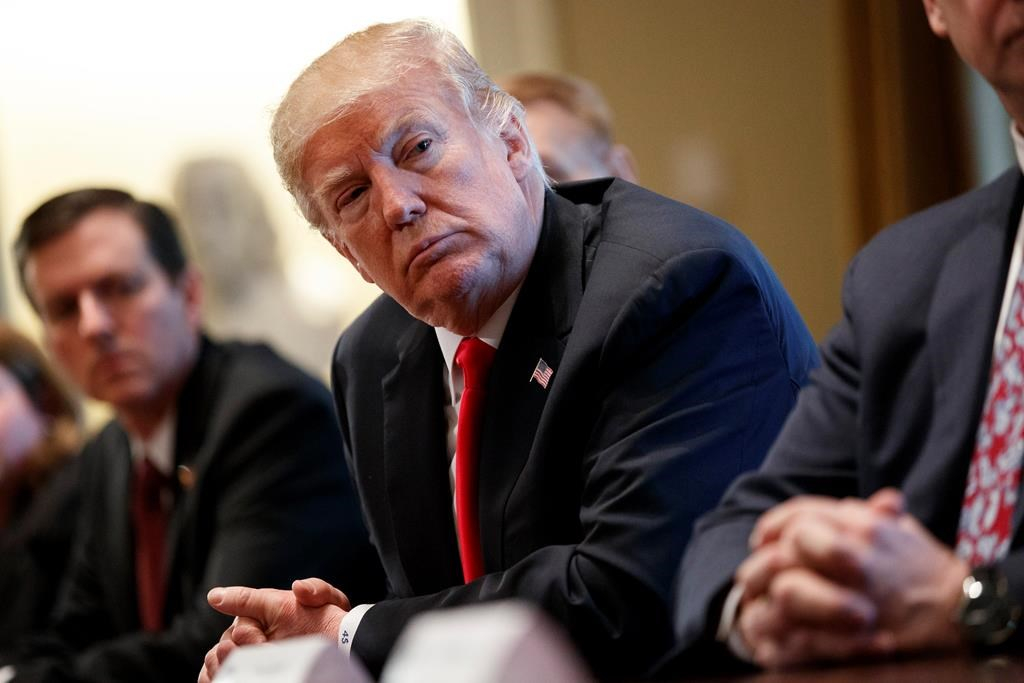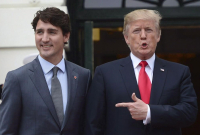Support strong Canadian climate journalism for 2025
A long-running academic debate about trade statistics has taken on new importance after U.S. President Donald Trump was caught on tape bragging about making up trade statistics during NAFTA negotiations with Prime Minister Justin Trudeau.
“Wrong, Justin, you do” run a trade surplus, Trump claimed to have said. “I didn’t even know… I had no idea.”
He isn’t the only one with no idea. Because of various quirks in economic measurement, different agencies have different data on the U.S.-Canada trade balance. (The trade balance is calculated by taking the value of Canadian goods and services exports minus U.S. imports. A positive value means Canada is running a trade surplus.)
Ironically, it’s Statistics Canada backing Trump’s claim, while team Trudeau repeatedly cites the U.S. Trade Representative (USTR), whose data says that it’s the U.S. with a small surplus. The two biggest U.S.-based trade databases also disagree on whether the U.S. runs a deficit with Canada: the International Trade Commission says yes, the National Bureau of Economic Research no.

Two theories might explain these discrepancies, which stem from the fact that StatsCan consistently reports more Canadian exports than the USTR has claimed to import.
Last month, StatsCan released a report making the case that more Canadian businesses import from third countries before “re-exporting” their products on to the States. StatsCan considers this a Canadian export, but the U.S. codes the product as being from the third country.
Canadian data also shows much higher levels of service exports than the U.S. reports receiving. This might occur when large U.S. companies do not report their Canadian-based service costs as imports, for example.
For StatsCan, correcting these discrepancies would increase the U.S.’s $27 billion deficit with Canada. From the USTR’s perspective, it would decrease the $3 billion American surplus, likely bringing the trade balance into deficit. In either case, the value of Canadian trade to the U.S. is understated. (Some agencies, like the the Bureau of Economic Analysis at the U.S. Department of Commerce, would agree: they reported a $50 billion Canadian surplus in 2016.)
However, whether Canada runs a surplus or deficit is only a minor point. Every data source does agree on one key fact: the U.S. trade deficit with Canada is closing. Whereas the trade balance has been strongly in Canada’s favour for decades, the U.S. has increasingly relied on Canadian oil, which jumped in price between 2008 and 2009. The U.S. now imports more oil from Canada than any other country.

Finally, it’s not clear that running a trade deficit is bad, especially for an economic superpower like the United States. Surpluses and deficits are measured in currency, which is actually an arbitrary unit. A dollar deficit with a certain country actually represents a goods and services surplus-- more foreign investment, more Japanese cars, more Ecuadorian bananas. Deficit countries are often fast-growing economies: growth pushes up incomes, attracts investment dollars, and allows consumers to buy more products from abroad. (These transactions, in turn, increase the deficit even more.)
Even economic hardliners agree: rich countries running trade deficits isn’t really a big deal. Daniel Griswold, former director for Trade Policy Studies at the right-wing Cato Institute, argues that “slapping higher tariffs on imports will only deprive foreigners of the dollars they would have earned in the U.S. market.” American consumers would have less choice over what to do with their money.
“The only reason the U.S. trade deficit is bad news is that so many people believe it is bad news,” he said.
-- with files from Ed Ngai






Comments